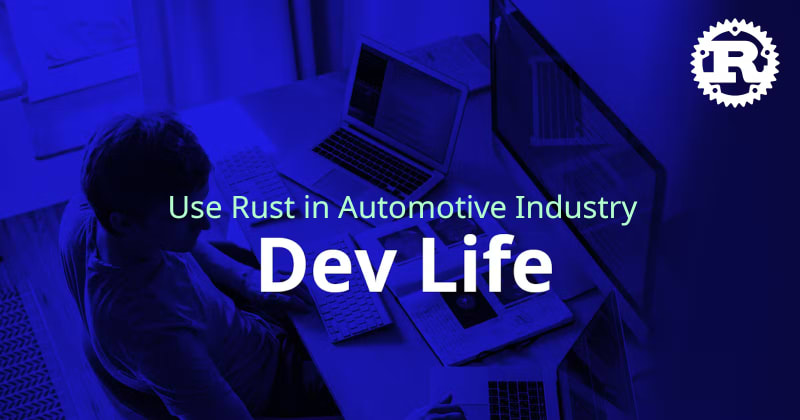The automotive industry is experiencing a significant transformation driven by the integration of software in vehicles.
From safety-critical systems to in-car entertainment and connectivity, software development has become a key driver of innovation in the automotive sector.
Rust, a programming language renowned for its emphasis on safety, performance, and reliability, is playing a pivotal role in this revolution.
In this article, we will explore the diverse applications of Rust in automotive software development and delve into how it effectively addresses the challenges encountered in this dynamic field.
Enhancing Safety and Reliability in Automotive Systems
Safety-critical systems lie at the heart of automotive software development. The reliability and security of software directly impact the well-being of vehicle occupants and other road users.
While traditional languages like C and C++ have long been utilized in this domain, they come with inherent risks such as memory-related vulnerabilities and undefined behavior.
Rust provides a compelling solution by offering robust safety guarantees through features such as ownership and strict compile-time checks.
The ownership system in Rust enables precise control over memory allocation and deallocation, effectively eliminating common issues like null pointer dereferences and buffer overflows.
By enforcing these safety measures at compile-time, Rust mitigates risks and enhances the overall reliability and robustness of automotive software, instilling confidence in its performance even in critical scenarios.
Unlocking Performance Optimization Potential with Rust
Performance optimization is a critical aspect of automotive software development, particularly in real-time systems where quick response times and efficient resource utilization are vital.
While languages like C and C++ have traditionally been favored for their low-level control and performance advantages, manual memory management poses challenges such as memory leaks and dangling pointers.
Rust strikes an ideal balance between performance and safety.
Its ownership and borrowing system allows for efficient memory management without the need for explicit deallocation, mitigating common memory-related issues.
Furthermore, Rust's concurrency model ensures safe and efficient parallel execution, harnessing the full potential of multi-core processors.
This unique combination of control, efficiency, and safety makes Rust an excellent choice for developing high-performance automotive software that meets the stringent demands of modern vehicles.
Empowering Connectivity and In-Car Entertainment Experiences
In the era of connected vehicles, software development for in-car entertainment systems and connectivity features presents its own set of challenges.
The software must seamlessly integrate with a wide array of hardware components, facilitate secure communication with external devices, and ensure reliability and data privacy.
Rust's reliability and robustness make it well-suited for addressing these challenges.
Its ownership and borrowing system, coupled with strong compile-time checks, help eliminate common bugs and vulnerabilities, enhancing data security and reducing the risk of potential breaches.
Rust's expressive type system empowers developers to create clear, maintainable code that effectively handles complex interactions between various components, ensuring seamless connectivity and enhanced in-car entertainment experiences.
Moreover, the extensive ecosystem of libraries and frameworks available in Rust provides specialized tools and resources tailored specifically for connectivity and entertainment applications in the automobile industry, facilitating rapid development and innovation.
Enabling Advanced Driver-Assistance Systems (ADAS)
The development of Advanced Driver-Assistance Systems (ADAS) is revolutionizing the automotive industry, with the aim of improving vehicle safety and enhancing the driving experience.
ADAS systems rely heavily on software to interpret sensor data, make real-time decisions, and assist drivers in critical situations.
Rust's safety and reliability features make it an excellent choice for ADAS software development.
The ownership and borrowing system in Rust minimizes the risk of memory-related errors, ensuring stable and predictable behavior.
This is crucial in ADAS systems where precise and timely response is paramount.
Additionally, Rust's strong compile-time checks and expressive type system aid in developing robust and error-free code, enabling the creation of ADAS software that meets the stringent safety requirements of the automotive industry.
Supporting Over-the-Air Updates and Maintenance
With the increasing complexity of automotive software, the ability to provide over-the-air updates and maintenance has become essential.
Software updates are necessary to address security vulnerabilities, introduce new features, and improve system performance.
However, ensuring the integrity and reliability of these updates poses challenges due to the critical nature of automotive systems.
Rust offers a secure and reliable platform for over-the-air updates and maintenance.
Its emphasis on memory safety and strong compile-time checks minimizes the risk of introducing bugs or vulnerabilities during the update process.
Furthermore, Rust's lightweight runtime and efficient code execution enable seamless and efficient updates, minimizing downtime for vehicles and enhancing the overall user experience.
By leveraging Rust, automotive manufacturers can ensure the timely delivery of updates and maintenance, keeping vehicles up-to-date and secure throughout their lifespan.
Driving Innovation Forward
Rust's presence in the automotive industry is driving innovation and pushing the boundaries of what's possible in software development for vehicles.
By leveraging the safety, performance, and reliability advantages of Rust, software programmers can create cutting-edge automotive software that enhances safety, optimizes performance, and delivers seamless connectivity and entertainment experiences.
As the automotive landscape continues to evolve, Rust's role in shaping the future of automotive technology will only grow stronger, enabling the development of smarter, more efficient, and highly connected vehicles.
Conclusion
By harnessing the unique features and advantages of Rust, software developers can create robust, secure, and high-performing automotive software that pushes the boundaries of innovation in the automobile industry, enabling the development of safer, more efficient, and highly connected vehicles.
Rust is not just making its importance felt in the automotive industry but is important in many other use cases as well such as Industrial Automation, IoT Devices, Embedded Systems, Robotics Industry, etc.



Top comments (0)